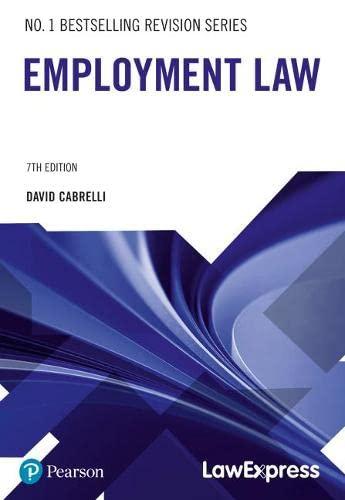Question
1) In Federal Baseball Club of Baltimore v. National League of Professional Baseball Clubs , the Supreme Court ruled that the National League of Professional
1) In Federal Baseball Club of Baltimore v. National League of Professional Baseball Clubs, the Supreme Court ruled that the National League of Professional Baseball Clubs did not violate Antitrust Laws because (choose the best answer):
| A. | The business of baseball did not involve interstate commerce. | |
| B. | None of the above. | |
| C. | Congress exempted baseball from the antitrust laws. | |
| D. | Stare decisis dictated that the Court had to continue baseball's exemption from the antitrust laws. |
2) In Dallas Cowboys Cheerleaders, Inc. v. Pussycat Cinema, Ltd., the Court held that Pussycat Cinema had infringed on the Dallas Cowboys Cheerleaders' trademark. Which of the following best describes the court's reasoning?
| A. | "Debbie" had all the physical characteristics of a Dallas Cowboys Cheerleader and therefore caused confusion by the public and injured the business reputation of the Dallas Cowboys Cheerleaders. | |
| B. | While Pussycat Cinema's movie was parody, it did not deserve 1st Amendment protection because it caused confusion by the public and injured the business reputation of the Dallas Cowboys Cheerleaders. | |
| C. | There is no defense to trademark infringement when pornogrophy is involved. | |
| D. | The Dallas Cowboys Cheerleaders' uniform was trademarkable and the use of the uniform depicted in the movie created an association with the Dallas Cowboys Cheerleaders that resulted in confusion by the public and injured the business reputation of the Dallas Cowboys Cheerleaders. |
3) InNCAA v. Alston, the Court held that the promotion of amateurism was a sufficient justification for rules limiting education related compensation because amateurism is a core value of the NCAA.
True or false ?
4) Which of the following is NOT a defense to trademark infringement:
| A. | The alleged trademark infringer used the trademark for informative purposes only (e.g. newscast). | |
| B. | The trademark holder discriminated against the alleged trademark infringer. | |
| C. | The alleged trademark infringer used the trademark as a parody. | |
| D. | The alleged trademark infringer had the consent of the trademark holder to use the trademark. |
5
Which one of the following is an exemption from antitrust laws (choose all that apply):
| A. | Start-up League Exemption - Via the Professional Sports Growth Act that allowed start-up leagues to be exempt from antitrust laws if they were competing with already existing professional leagues. | |
| B. | Major League Baseball. | |
| C. | Nonstatutory Labor Exemption. | |
| D. | Broadcasting Exemption - Via the Sports Broadcasting Act that allowed professional hockey, football, baseball, and basketball to pool and sell their rights in sponsored telecasts of games. |
Step by Step Solution
There are 3 Steps involved in it
Step: 1

Get Instant Access to Expert-Tailored Solutions
See step-by-step solutions with expert insights and AI powered tools for academic success
Step: 2

Step: 3

Ace Your Homework with AI
Get the answers you need in no time with our AI-driven, step-by-step assistance
Get Started


